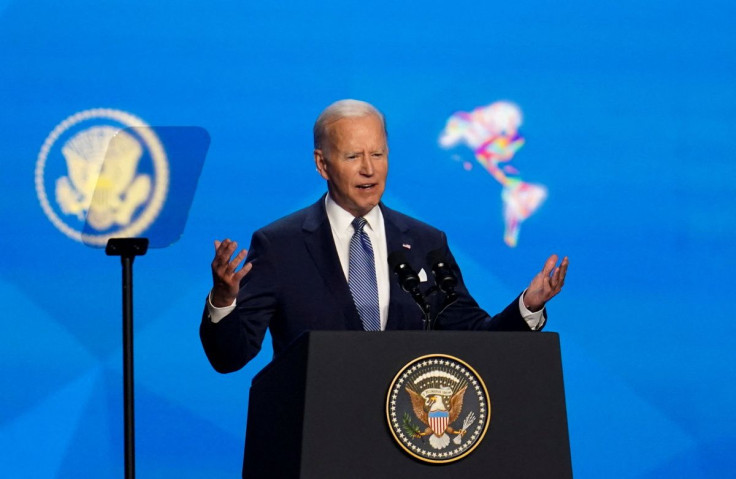Biden Pitches Economic Partnership At Americas Summit Riven By Division

U.S. President Joe Biden laid out his pitch to leaders from the Americas for a new economic partnership at the start of a regional summit on Thursday, even as he faced open rebuke over the exclusion of Venezuela, Cuba and Nicaragua.
Speaking at the opening session of the Summit of the Americas in Los Angeles, Biden said his administration was committed to helping Latin America and the Caribbean recover from the COVID-19 pandemic, tackle irregular migration and improve living standards.
But he quickly faced sharp pushback over his decision to cut out Washington's three main regional antagonists, which spurred a boycott by some leaders led by Mexican President Andres Manuel Lopez Obrador, dealing a blow to Biden's effort to reassert U.S. leadership.
Shortly after Biden's speech that extolled the virtues of democracy in the region, Belize's Prime Minister John Briceno, criticized the exclusion of Communist-ruled Cuba and leftist Venezuela, calling the "illegal blockade against Cuba" an "affront to humanity."
"In fact, it is un-American. The time has come, Mr. President, to lift the blockade," Briceno said, confronting Biden as he sat only a few feet away from him.
Briceno was followed by Argentina's left-leaning president, Alberto Fernandez, who declared "the silence of those who are absent is calling to us" and insisted that the host country did not have the power to impose "right of admission" to the conference.
Responding in his closing remarks, Biden told the leaders: "I heard a lot of important ideas raised. Notwithstanding some of the disagreements related to participation, on the substantive matters, what I heard was almost unity."
The summit was conceived as an opportunity to rebuild U.S. influence and counter China's growing economic inroads in the region. But Biden's agenda has been undercut by the controversy over the guest list.
Speaking at a U.S. Chamber of Commerce-sponsored conference in Los Angeles, Biden urged U.S. business executives to help bolster the region's troubled economies with increased investment and support for his environmentally friendly partnership plan.
"I'm going to continue to work just as I did when I was vice president, with Barack Obama, to promote trade and investment in clean energy," Biden told fellow leaders at the first plenary.
Biden's hosting of the opening session heavily focused on clean energy initiatives was to be followed by his first formal encounter with Brazilian President Jair Bolsonaro, an outspoken climate change skeptic.
SUPPLY CHAINS
He outlined his proposed "Americas Partnership for Economic Prosperity" to the business conference, saying it was aimed at bringing supply chains closer to home, reforming the Inter-American Development Bank, streamlining investment and kicking climate actions "into high gear."
But the plan, which appears to be a work in progress lacking many specifics, stops short of offering tariff relief and will initially focus on countries that already have U.S. trade accords.
Taking a veiled dig at China, Biden said: "We want to make sure our closest neighbors have a real choice between the debt trap development that has become ... more and more common in the region, and the high-quality transparent approach to infrastructure investment that delivers lasting gains for workers and families."
U.S. officials have openly accused China of pushing deals in the developing world with strings attached to saddle their partners with long-term debt.
With problems at the U.S.-Mexico border also high on Biden's list of priorities, leaders were poised to issue a declaration on Friday pledging measures to curb irregular migration and help countries hosting large number of migrants to cope with them, according to a draft document seen by Reuters.
The White House did not immediately respond to a request for comment on whether the document was final.
CHALLENGES AT HOME AND ABROAD
Biden on Thursday chaired leaders' talks aimed at promoting energy security as Western powers try to lower their dependence on oil and gas from Russia.
He hosts the summit facing challenges at home and abroad ranging from surging inflation, debate over gun control after more mass shootings, and the war in Ukraine.
Yet instead of burnishing regional unity, the summit has been bedeviled by diplomatic strife sparked by Washington's exclusion of three countries, citing their poor records on human rights and democracy.
That upset allies of the leftist trio of countries, in particular Lopez Obrador, who made good on a threat to stay away if all nations were not invited.
Other leaders said they would do the same, and did so, thinning the line-up of visiting heads of state and government in attendance to 21.
"No," Biden responded when a reporter asked whether he was concerned about some leaders boycotting the summit. His aides have played down the absences.
Speaking in Mexico City, Lopez Obrador backed Washington's drive to strengthen economic ties in the region, but urged the United States to get over its decades-long differences with Cuba. Havana was invited to the past two Americas summits.
"America should integrate economically and commercially while respecting the sovereignty of each country," he said.
The partial boycott has given greater prominence to the first meeting between Biden and Bolsonaro, an admirer of former U.S. President Donald Trump who this week again cast doubt on Biden's 2020 election victory.
© Copyright Thomson Reuters 2024. All rights reserved.




















